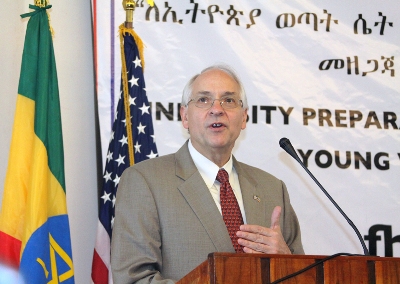US “out of patience” with South Sudan’s warring sides: envoy
July 30, 2015 (JUBA) – The United States special envoy to Sudan and South Sudan, Donald Booth said his country had run of patience over delays by South Sudan’s warring factions to resolve the ongoin conflict that has killed tens of thousands of people.

“Too many lives have been lost, millions of South Sudanese have been displaced and too many are at the verge of starvation and facing homelessness. The talks can’t continue without end,” he added.
According to IGAD, talks between the two warring factions will resume on 6 August, with a final peace deal expected on 17 August.
Booth urged South Sudan government and its armed opposition to strike a peace deal, saying “This situation can’t go on any longer.”
His remarks come days after US President Barack Obama praised regional efforts to end a conflict pitting his South Sudan counterpart, Salva Kiir and the country’s former vice president, Riek Machar.
A close ally of South Sudan, Washington played a key role ending over two decades of a bloody civil war fought between the Arab-dominated North Sudan and Christians south of the country. The US also supported a self-determination referendum in southern Sudan in January 2011, which saw the south secede from north six months later.
Since the war broke out in South Sudan in December 2013, tens of thousands of South Sudanese have been killed and more than 2.2 million people have been displaced. Up to 4.6 million, aid agencies say, are most likely to face life-threatening hunger in coming weeks.
CALL FOR NEW PEACE APPROACH
Andrew Natsios, a former US envoy to South Sudan, said an entirely new approach was needed if the current negotiations by IGAD fail.
“The United States government and European countries should initiate new talks with new sponsors. And the immediate priority of those discussions should be to weaken the military capacity of the warring parties while urgently brokering a humanitarian cease-fire,” he wrote in an op-ed published in the New York Times on Thursday.
Natsios said the so-called IGAD-Plus talks have failed to bring about a viable peace agreement because some of the mediators are not impartial brokers, citing Khartoum which has allegedly been supplying South Sudan with weapons to keep the country unstable.
“The most effective military troops there now are the Ugandan People’s Defense Force, which President Yoweri Museveni of Uganda sent in to help Mr. Kiir, who is a friend and ally, stay in power. Ethiopia, which has a significant Nuer population, can press only gingerly the Nuer rebel leaders and commanders in South Sudan,” he said.
The former US envoy to South Sudan further proposed that senior military commanders from the two sides be included in the negotiations.
“In fact, they must be: When in the past the
government in Juba has issued humanitarian access permits to United Nations relief agencies, commanders in the field have ignored them and stopped aid shipments,” stressed Natsios.
Allowing commanders participate in the talks, he said, will most likely see them enforce what they agreed upon at the negotiating table.
GRASSROOT RECONCILIATION
According to Natsios, local Christian churches and local civil society groups should be encouraged to start grassroots reconciliation initiatives, especially to ease tensions between the Nuer and Dinka.
“The churches in particular, which claim the loyalty of 60 percent of the population, are a rare indigenous actor with both moral authority and a reach that transcends tribe and region,” he wrote Thursday.
The former US envoy urged international aid agencies to fund the training of church leaders in mediation techniques and set up a pilot program to create local dispute-resolution committees using church leaders, with a view to eventually extending it across the country.
PRESIDENT OBAMA BLAMED
Sections of the US media faulted the US President for doing very little to end nearly 20 months of conflict in the world’s youngest nation.
While addressing an African Union session in Addis Ababa, Ethiopia, Obama warned of likely consequences should the two South Sudanese warring factions failing to meet the 17 August deadline.
“So far, threats of punishment have done little to deter the combatants. This time probably won’t be different. It may be hard for the United States to discipline the leaders of South Sudan after all that went into the quest for independence; many officials of the present administration invested heavily in hopes for the new country,” the Washington Post wrote in its Thursday’s editorial.
It added, “But they must end the hand-wringing. In order to save the people of South Sudan from further misery and suffering, it is time to impose an arms embargo, travel bans and much stronger sanctions aimed squarely at the individuals responsible for the horrors”.
(ST)
